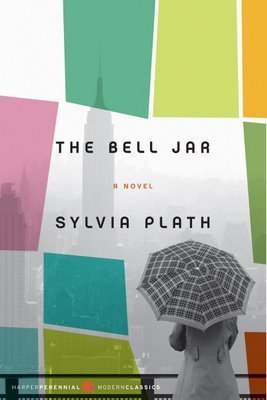 I finished The Bell Jar a few days ago, but I’ve been putting off writing about it because I’m still not sure of my opinion. I started with 4 stars on Goodreads, then went back and changed it to five because it’s an amazing book. My only real issue with it is that it’s so autobiographical that it seems like it fits better into the memoir category. But I’ll get to that.
I finished The Bell Jar a few days ago, but I’ve been putting off writing about it because I’m still not sure of my opinion. I started with 4 stars on Goodreads, then went back and changed it to five because it’s an amazing book. My only real issue with it is that it’s so autobiographical that it seems like it fits better into the memoir category. But I’ll get to that.
I’ve spent way too long thinking about this book. Let’s get on with the review.
You’ve probably know what happens in The Bell Jar: Sylvia (ahem, Esther) goes off to New York for a super-duper internship, discovers that she’s directionless, finds herself depressed and suicidal, and ends up getting shock treatments in a mental hospital. But that’s just the surface. My favorite part of this novel is the beginning, before she stops functioning. She’s an intern for a major fashion magazine, and she deals reasonably well with the social and work-related pressures involved. That part of the novel was really fun, but it only made up a third of it, or so. When Esther gets home, she becomes lethargic and visits a psychiatrist after she hasn’t washed her hair or changed her clothes for three weeks. Things go downhill from there.
I vaguely remember reading The Bell Jar when I was in high school, along with Prozac Nation and Girl, Interrupted and the like, in my Stupid Angsty Teenage Phase (it’s almost funny that I can condense it to that now). I’m surprised that I didn’t really remember anything about it because I can see how it might have been my favorite novel at that point. On the other hand, I can also see that I might have been too young and inexperienced to appreciate it, like I hit it at the wrong time. It’s always interesting to reread books from my childhood and experience them from an entirely different perspective. A good example of that is Something Wicked This Way Comes, which I first read when I was fourteen or so. I think I appreciate The Bell Jar more now that it’s been so long since I was a teenager.
Which all means that my perspective on this novel might be a bit skewed by my past experiences.
I’m not saying that’s a bad thing. I think that Sylvia Plath made her past experiences into a fantastic novel, but I’m not sure that there’s enough straight fiction not to make it a memoir. After The Bell Jar she planned to write another “novel” about her later life, but, as far as I know, she never published it. I’ve read lots of her poetry, which is intensely personal, and I wonder if she was capable of separating herself from her work enough not to write about herself. I also wonder what that means about Sylvia Plath. We can gather that she never got out from under the “bell jar” of depression, and such an intense psychological state can easily get one stuck on introspection…but my purpose here isn’t to further psychoanalyze Plath. It’s to explain that The Bell Jar is an amazing, very approachable classic novel, and, despite what you might think about both Plath and this work, you should give it a chance. It’s really good, and it’s beautifully written. It’s definitely worth your time.
Photo credit: Shin Yoo
